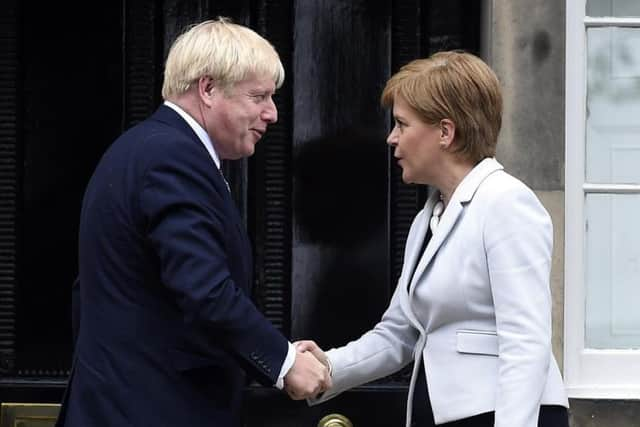Scottish independence: What now for Nicola Sturgeon after Boris Johnson says 'no'?
In a short letter to the First Minister sent this morning, and published on Twitter, the Prime Minister ruled out granting a Section 30 Order which would transfer the powers needed for the Scottish Government to hold a referendum.
Mr Johnson was responding to a letter from Ms Sturgeon sent before Christmas, which claimed the General Election had given the SNP a mandate for indyref2. The SNP also sent the Prime Minister a document entitled "Scotland's Right to Choose" which the party said laid out the "democratic case" for a second referendum. It also asked that the power to hold independence referendums be transferred from Westminster to Holyrood permanently.


Advertisement
Hide AdAdvertisement
Hide Ad"The problem for the Tories is the longer they try to block democracy, the more they show the Westminster union is not one of equals and fuel support for independence. This response predictable - but also unsustainable and self defeating. Scotland will have the right to choose."
Her response was not unpredictable. But it does not lay out what the SNP believes it will now be able to do - and the options are few.
So what happens now?
Just yesterday two highly respected constitutional academics, Professor Aileen McHarg and Chris McCorkindale laid out why a legal challenge would be unlikely to succeed, should it end up in court.
Ms Sturgeon and her constitution relations minister Mike Russell have previously mooted the idea of legal action, however in their report yesterday, McHarg and McCorkindale said there were "no legal short cuts" to independence.
Further, they said any attempt by the First Minister to press ahead with a legal challenge would likely fail as there's no legal duty on the UK government to grant a Section 30 Order. However, they also admitted that the matter has never been tested in court and it is likely the Scottish Government will fully explore how far they can go down that route.
Legal issues aside, an attempt to hold an "advisory referendum" could be met with a refusal by Scottish councils - the bodies which run elections - to co-operate in organising the ballot and count, and a refusal by voters who want to remain in the UK to take part in the vote at all.
.Civil action
When she launched the Scotland's Right to Choose document Nicola Sturgeon said she supported civil displays of demands for independence - and marches of the kind seen in Glasgow at the weekend, attended by tens of thousands of independence supporters, will no doubt now increase in frequency. Whether they will increase in numbers however - and take place anywhere else in Scotland - is yet to be seen.
The real test of what Scots really think on the holding of indyref2 will come next year in the Holyrood elections. Without a doubt the SNP will frame that election as a referendum on a referendum - a vote for them will be equal to a demand for a second independence vote. And of course the fall-out from leaving the EU will be known, which could sway Remain voters into backing an SNP which promises an independent Scotland would rejoin the European Union.
Advertisement
Hide AdAdvertisement
Hide AdCertainly, if the SNP win an outright majority, its claim for a second referendum will be far tougher for Boris Johnson and others to ignore. Scottish Secretary Alister Jack will be kicking himself for ever uttering the words that such an outcome would constitute a "democratic mandate".
Opposition parties will, of course, attempt to change that election framing and to focus on the SNP's record in government, but as has been proved time and again since 2014, in Scotland elections are all about the constitution, stupid.
